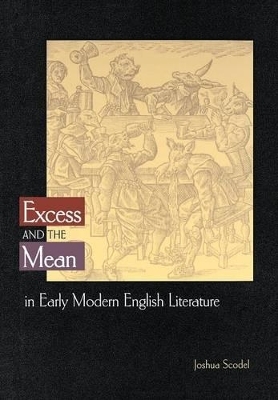
Excess and the Mean in Early Modern English Literature
Princeton University Press (Verlag)
978-0-691-09028-3 (ISBN)
This book examines how English writers from the Elizabethan period to the Restoration transformed and contested the ancient ideal of the virtuous mean. As early modern authors learned at grammar school and university, Aristotle and other classical thinkers praised "golden means" balanced between extremes: courage, for example, as opposed to cowardice or recklessness. By uncovering the enormous variety of English responses to this ethical doctrine, Joshua Scodel revises our understanding of the vital interaction between classical thought and early modern literary culture. Scodel argues that English authors used the ancient schema of means and extremes in innovative and contentious ways hitherto ignored by scholars. Through close readings of diverse writers and genres, he shows that conflicting representations of means and extremes figured prominently in the emergence of a self-consciously modern English culture. Donne, for example, reshaped the classical mean to promote individual freedom, while Bacon held extremism necessary for human empowerment.
Imagining a modern rival to ancient Rome, georgics from Spenser to Cowley exhorted England to embody the mean or lauded extreme paths to national greatness. Drinking poetry from Jonson to Rochester expressed opposing visions of convivial moderation and drunken excess, while erotic writing from Sidney to Dryden and Behn pitted extreme passion against the traditional mean of conjugal moderation. Challenging his predecessors in various genres, Milton celebrated golden means of restrained pleasure and self-respect. Throughout this groundbreaking study, Scodel suggests how early modern treatments of means and extremes resonate in present-day cultural debates.
Joshua Scodel is Associate Professor of English, Comparative Literature, and the Humanities at the University of Chicago. He is the author of The English Poetic Epitoph.
Acknowledgments and Note on Citations vii Introduction: Ancient Paradigms in Modern Conflicts 1 PART ONE: Two Early Modern Revisions of the Mean 19 1. Donne and the Personal Mean 21 2. "Mediocrities "and "Extremities ": Baconian Flexibility and the Aristotelian Mean 48 PART TWO: Means and Extremes in Early Modern Georgic 77 3. Moderation,Temperate Climate,and National Ethos from Spenser to Milton 79 4. Concord, Conquest, and Commerce from Spenser to Cowley 111 PART THREE: Erotic Excess and Early Modern Social Conflicts 143 5. Passionate Extremes and Noble Natures from Elizabethan to Caroline Literature 145 6. Erotic Excess versus Interest in Mid-to Late-Seventeenth-Century Literature 170 PART FOUR: Moderation and Excess in the Seventeenth-Century Symposiastic Lyric 197 7. Drinking and the Politics of Poetic Identity from Jonson to Herrick 199 8. Drinking and Cultural Conflict from Lovelace to Rochester 225 PART FIVE: Reimagining Moderation:The Miltonic Example 253 9. Paradise Lost ,Pleasurable Restraint, and the Mean of Self-Respect 255 Postscript: Sublime Excess, Dull Moderation, and Contemporary Ambivalence 285 Notes 289 Index 353
| Erscheint lt. Verlag | 24.3.2002 |
|---|---|
| Reihe/Serie | Literature in History |
| Verlagsort | New Jersey |
| Sprache | englisch |
| Maße | 152 x 235 mm |
| Gewicht | 680 g |
| Themenwelt | Geisteswissenschaften ► Philosophie ► Philosophie Altertum / Antike |
| Geisteswissenschaften ► Philosophie ► Philosophie des Mittelalters | |
| Geisteswissenschaften ► Sprach- / Literaturwissenschaft ► Anglistik / Amerikanistik | |
| Geisteswissenschaften ► Sprach- / Literaturwissenschaft ► Literaturgeschichte | |
| ISBN-10 | 0-691-09028-9 / 0691090289 |
| ISBN-13 | 978-0-691-09028-3 / 9780691090283 |
| Zustand | Neuware |
| Haben Sie eine Frage zum Produkt? |
aus dem Bereich


